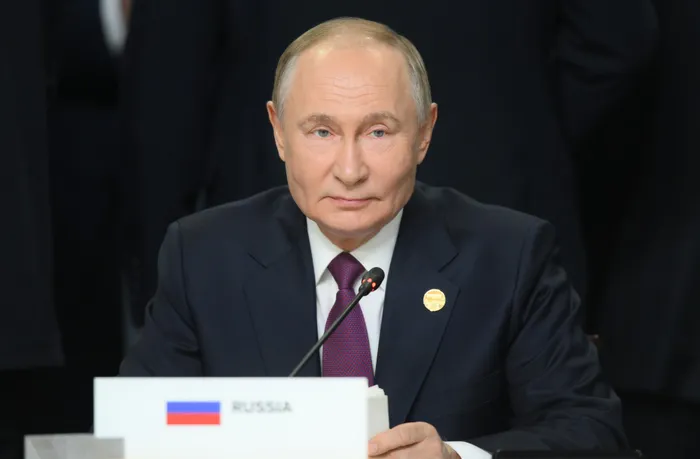South Africa takes bold step towards peace as Jews and Muslims global tensions rise
'Millimetres away from a nuclear disaster'

Russian President Vladimir Putin recently warned that the US's involvement in the war would aggravate a situation that was already “millimetres away from a nuclear disaster.”
Image: Alexei Danichev/Sputnik
Amid escalating violence in Gaza, rising tensions in Iran, and a polarised world, South Africa has taken a bold stand in the global political arena by taking Israel to the International Court of Justice (ICJ).
The country’s government has filed a case against Israel, challenging its military actions and treatment of Palestinians. This move has sparked a broader conversation about the Muslim-Jewish divide that has torn through the Middle East and reverberated globally.
As tensions rise between Jews and Muslims, a unique initiative has emerged in South Africa. A group led by Imran Makama of Friends of Israel (FOI) and Ibrahim Qasim of the International Democratic Society (IDS) are pushing for peace between Jewish and Muslim communities within the country, defying the prevailing animosity.
Makama, Qasim, and their ally Joel Ibris, a Jewish resident of Houghton, are working to combat the growing divisions threatening both local and international relations.
Despite the violence abroad, the trio remains hopeful that their example can bridge the gap between these historically divided communities.
"We must not let the events of the Middle East and the influence of America divide us or our nation," said Makama. "We are here in South Africa, a land of peace and reconciliation, and we must exist together. The bombs and the rhetoric overseas should not dictate how we live with our Muslim neighbours here. We have to be the example."
These remarks come at a time when Israel's military operations in Gaza have sparked widespread outcry, particularly following reports of civilian casualties.
However, Makama emphasised that there is a crucial distinction between the actions of the Israeli government and the beliefs of Jewish people worldwide.
"People need to understand that the idea that all Jews support Netanyahu and the bombing of Gaza is a misrepresentation," said Ibris, who has lived in South Africa for several years. "It’s a false narrative. Many Jews, including myself, are deeply disturbed by the violence and want nothing more than peace. Like our Muslim brothers and sisters, we are impacted by the bloodshed and call for justice."
South Africa’s stance on the Israeli-Palestinian conflict has long been one of vocal support for Palestinian rights, with comparisons often drawn to the apartheid struggle faced by black South Africans. In line with this, South Africa's recent legal move to bring Israel before the ICJ challenges its military occupation of Palestinian territories and human rights violations. This move has garnered international attention and sparked discussions about how countries should address international conflict.
Russian President Vladimir Putin recently warned that the US's involvement in the war would aggravate a situation that was already “millimetres away from a nuclear disaster.”
The nuclear threat looms over the region, with Putin’s comments highlighting the potential for catastrophe. The U.S.’s unwavering support for Israel, including military aid and strategic backing, has fueled tensions. Ibrahim Qasim, a vocal critic of American foreign policy, slammed the U.S.'s role in the conflict, calling it "an unrelenting force that has exacerbated the bloodshed."
"The U.S. has continuously supported Israel, pouring fuel on a fire that already burns too hot," Qasim said. "Their actions have not only prolonged the suffering of Palestinians but also made peace in the region almost impossible. The influence of the US has been disastrous, and it continues to ignore the cries for justice from both Palestinians and peace-loving Jews. We cannot allow this foreign influence to dictate our future."
Qasim further pointed out that Washington’s blind support for Israel undermines the possibility of a peaceful solution. "The United States needs to stop acting as though it holds the moral high ground while fueling the destruction. Its double standards and hypocrisy are undeniable. Instead of building peace, they have become a pillar of division."
In contrast to the destructive global rhetoric, South Africa’s peace-building efforts aim to offer an alternative path through legal action and peaceful coexistence at home.
Makama, Qasim, and Ibris are committed to rising above the destructive rhetoric, hoping that their efforts can set an example for the world. They believe that by working together, Jews and Muslims can demonstrate that reconciliation is possible, even in the face of global conflict.
"We understand that our actions here are small in comparison to the global stage," said Qasim. "But if we can show the world that Jews and Muslims can coexist peacefully in the same country, that will be a powerful message to the rest of the world. We must focus on building bridges, not walls."
Their efforts reflect South Africa's broader tradition of conflict resolution, rooted in Nelson Mandela’s vision of post-apartheid reconciliation. In a country that has long championed human rights, the move to challenge Israel at the ICJ is a bold statement against injustice, balanced by a commitment to peace within its borders.
In a world increasingly defined by division, South Africa’s peaceful initiative offers hope. While the road to reconciliation may be long, the example set by Makama, Ibris, Qasim, and others shows that unity can still thrive, even amid global turmoil.